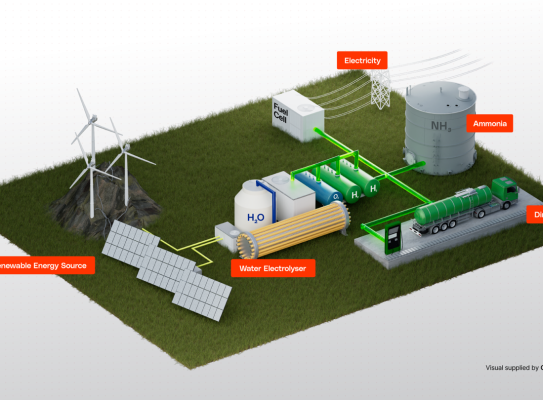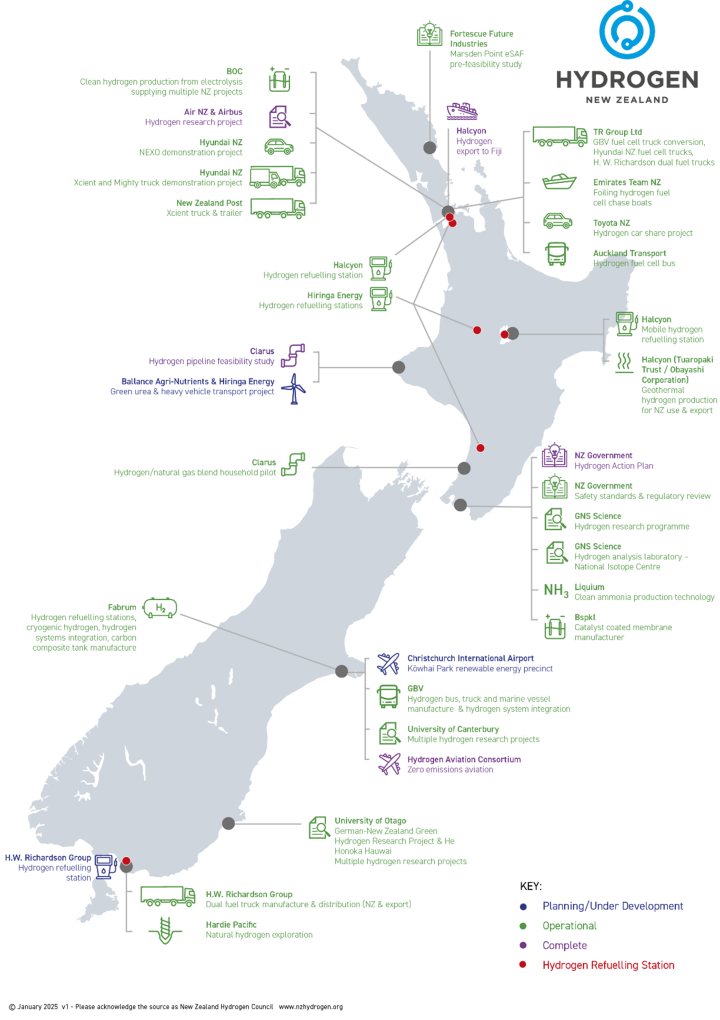New Zealand’s Green Hydrogen Ecosystem Update 2025

This report is the third in an annual series providing an overview of green hydrogen developments in New Zealand and international context produced by the Aotearoa: Green Hydrogen Platform research programme, led by Earth Sciences New Zealand (formerly GNS Science).
Authors: Michelle Cook and Nick Kirkman
Executive Summary
The last year has been marked by significant infrastructure developments, policy evolution, and increasing industrial adoption, with New Zealand establishing itself on the global stage with regard to green hydrogen deployment despite global project delays and market uncertainties.
Global developments have created headwinds for investment and, following a peak of international interest and excitement in recent years, green hydrogen appears to be moving into the consolidation phase of its growth as a new technology.

New Zealand's Green Hydrogen Ecosystem developments during 2024-2025
-
Infrastructure and Production
Hiringa Energy Network Expansion Hiringa Energy is spearheading a network of refuelling stations aimed at scaling up grid-connected hydrogen production and distribution. Hiringa green hydrogen refuelling stations produce, store and dispense green hydrogen on-site. The first refuelling station of this network was opened in Auckland in April 2024, with others now open in Hamilton and Palmerston North, another to follow in Tauranga currently under construction, and 20 further stations in planning across both the North and South Island. The company has also announced plans for a refuelling network in Eastern Australia.
Halcyon Power’s Geothermal Green Hydrogen Facility Halcyon Power, a joint venture between Japan’s Obayashi Corporation and Māori land organisation Tūaropaki Trust, opened New Zealand’s first green hydrogen fast refuelling station in Auckland in April 2024. The hydrogen for this station is produced at Halcyon’s green hydrogen production facility at the Tūaropaki Power Station in Mōkai. This represents a significant milestone as New Zealand’s first commercial-scale green hydrogen production facility powered by geothermal energy, with the capability to produce around 180 tonnes per annum.
Firstgas Hydrogen Blending Pilot Firstgas will soon be commencing New Zealand’s first hydrogen blending pilot, which will see a small amount of green hydrogen blended with natural gas into the existing Te Horo natural gas pipeline for 3-6 months of 2025. This blended gas will be used by up to 15 households, with the hydrogen content starting at 3.5% and moving up to a maximum of 15% near the end of the pilot. This hydrogen content will not require any additional modification to the pipeline infrastructure or user appliances. This represents a crucial step in integrating hydrogen into existing energy infrastructure, with Firstgas releasing a study in 2021 finding that gas pipeline networks in New Zealand could carry up to 20% hydrogen by 2035, to 100% hydrogen by 2050.
-
Heavy Transport Testing and Real-World Deployment
Hydrogen Truck Field Testing TR Group organised practical demonstrations of hydrogen trucks in Auckland, giving truck drivers and fleet operators their first hands-on experience with zero-emission hydrogen vehicles. The testing involved two trucks - one built in New Zealand by Christchurch-based Global Bus Ventures, the other built by Hyundai. Drivers reported remarkably quiet operation, with the trucks producing almost no audible engine noise.
Expanded Hydrogen Truck Production TR Group has ordered 20 hydrogen trucks for lease to commercial operators, to be built by local innovator Global Bus Ventures. This represents a significant expansion from New Zealand Post’s single pioneering hydrogen truck that has successfully operated for two years and ticked over 100,000 km. TR Group was able to secure funding from the Energy Efficiency and Conservation Authority (EECA) to purchase the trucks for lease to others who are interested in this new technology but may not be ready to commit to purchasing the hydrogen trucks themselves. With 20 additional trucks on the road in New Zealand, companies will be better able to compare these with alternative zero-emission vehicles such as battery electric trucks, in our New Zealand on road conditions, promoting decarbonisation of our transport sector.
-
Aviation Sector Breakthroughs
Aviation Consortium Progress The New Zealand Hydrogen Aviation Consortium, made up of Christchurch Airport, Airbus, Air New Zealand, Fabrum, Fortescue, and Hiringa, was established in 2023 to design an ecosystem for green hydrogen aviation within New Zealand and to support New Zealand in becoming a leader in the testing and deployment of these low emission aircraft and technologies.
Fabrum’s World-First Testing Facility As part of the Aviation Consortium, Fabrum launched a hydrogen testing facility established at Christchurch Airport’s 400-hectare Kowhai Park renewable energy precinct, in February 2025. The facility enables development of liquefiers, gas management systems, and boil-off gas management technologies critical for aviation applications. Bringing hydrogen testing facilities to the ecosystem will facilitate partnerships and alliances to de-risk technology and advance hydrogen projects domestically and internationally.
-
Research and Manufacturing Expansion
A Strategic Acquisition Fabrum has acquired Alec Farrar Engineering Limited, a Christchurch-based engineering company and foundry. Alec Farrar has previously manufactured castings for Fabrum’s flagship cryocooler technology. This acquisition will expand Fabrum’s manufacturing capability to support growth driven by growing demand for its hydrogen systems and other technologies.
International Partnerships and Export Development Fabrum has partnered with Fortescue to design, build and commission Australia’s largest liquid hydrogen plant at a mine site. Liquid hydrogen from the plant will be used to power zero-emissions mining equipment prototypes by Fortescue. It is expected that the plant will be able to produce 350 kg of liquid hydrogen per day with 600 kg of storage. Fabrum has also entered an agreement with Toyota to supply its proprietary liquid hydrogen storage technology, demonstrating growing international recognition of New Zealand hydrogen expertise.
-
Industry Directions
New Zealand Hydrogen Council The industry body continues to represent the New Zealand Hydrogen ecosystem and promote the development of a low-emission hydrogen economy in New Zealand. The Council maintain useful such as a map of New Zealand Hydrogen Projects, reproduced below, and interactive layered infrastructure maps.
Hydrogen Industry Leadership Group The New Zealand Hydrogen Council and its members have been working with the Minister for Energy and the Minister for Climate Change to participate in the Hydrogen Industry Leadership Group to provide perspectives on policy to accelerate the development of a green hydrogen ecosystem in New Zealand. This work has been provided in a report “The role of Government and the policy actions required to enable the development of a low-emissions hydrogen sector in New Zealand.” This report summarises the views and recommendations of the group and outlines policy priorities:
1. Reviewing the existing regulatory barriers to the uptake of low-emissions heavy vehicles
2. Delivering fit for purpose hydrogen regulations and safety standards framework
3. Reviewing the existing barriers to consenting of renewable electricity and hydrogen projects
4. Adopting targeting policy interventions that enable a market led transition
5. Prioritising the hydrogen export opportunity in New Zealand
-
Policy and Regulation
Government Strategy The New Zealand Government has built on its Interim Hydrogen Roadmap (2023) with a Hydrogen Action Plan (2024) to unlock private investment in hydrogen. The four government priorities laid out in the Action Plan are 1) Creating an enabling regulatory environment, 2) Reducing barriers for consenting hydrogen projects, 3) Promoting a cost-effective and market-led transition to a low-emissions economy, and 4) Supporting access to international investment and markets.
Policy and Subsidies The New Zealand Government via the Energy Efficiency and Conservation Authority (EECA) administers a Low Emissions Heavy Vehicle Fund (LEHVF). The LEHVF provides grants of up to 25% of the purchase price of new low or zero-emissions heavy vehicles or 25% of the cost to convert an existing ICE heavy vehicle to be powered by approved low-emissions technologies, including hydrogen fuel cell and hydrogen-diesel dual fuel vehicles, encouraging the uptake of these technologies in New Zealand.
Standards and Regulation Standards New Zealand reviewed the technical standards regulating the production, distribution, and utilisation of hydrogen and in July 2024 New Zealand adopted 13 international hydrogen-related equipment safety standards.
Government Consultation In 2025 the New Zealand Ministry for Business, Innovation, and Employment (MBIE) consulted on how to regulate natural/white and orange hydrogen. This consultation will inform whether these forms of hydrogen are defined as a mineral under the Crown Minerals Act 1991 (CMA) and therefore whether the mineral rights are owned by the crown or can be privately owned. These decisions will have an i

Key Challenges and Opportunities
1. Renewable Energy Advantage: New Zealand’s high renewable electricity generation provides a competitive advantage for green hydrogen production.
2. Strategic Location: The country’s position in the Pacific makes it well-placed for hydrogen exports to Asia-Pacific markets.
3. Early Mover Advantage: New Zealand’s early infrastructure development positions it as a regional leader in hydrogen deployment.
4. Innovation Hub: The growing research community and industry collaboration create opportunities for technology development and export.
-
References
1. GNS Science - 2024 Annual NZ Hydrogen Ecosystem Update: https://www.gns.cri.nz/our-science/energy-futures/green-hydrogen/2024-annual-nz-hydrogen-ecosystem-update/(external link)
2. Russell McVeagh - Energy Sector Review 2024: https://www.russellmcveagh.com/insights-news/energy-sector-in-new-zealand-reviewing-2024-and-looking-to-2025/(external link)
3. New Zealand Hydrogen Council - NZ Hydrogen Projects: https://www.nzhydrogen.org/nz-hydrogen-projects(external link)
4. New Zealand Hydrogen Council - Media Releases: https://www.nzhydrogen.org/media-releases(external link)
5. University of Canterbury - Green Hydrogen Research: https://www.canterbury.ac.nz/news-and-events/news/2025/harnessing-green-hydrogen-for-new-zealand-s-energy-future(external link)
6. Ammonia Energy Association - World-scale Green Hydrogen in NZ: https://ammoniaenergy.org/articles/world-scale-green-hydrogen-and-ammonia-in-new-zealand-from-2025/(external link)
7. Green Hydrogen Organisation - New Zealand Profile: https://gh2.org/countries/new-zealand(external link)
8. GNS Science - NZ Hydrogen Symposium 2024: https://www.gns.cri.nz/news/new-zealand-hydrogen-symposium-2024/(external link)
9. RNZ - Truck Drivers Test Zero Emissions Hydrogen Trucks: https://www.rnz.co.nz/news/environment/556393/truck-drivers-get-first-taste-of-driving-zero-emissions-hydrogen-trucks(external link)
10. Christchurch Airport - Fabrum Hydrogen Testing Facility: https://www.christchurchairport.co.nz/about-us/who-we-are/media/2025/fabrum-launches-hydrogen-testing-facility-at-christchurch-airport-to-accelerate-zero-emission-aviation/(external link)
11. The Conversation - Hope or Hype: NZ Green Hydrogen Analysis: https://theconversation.com/hope-or-hype-nz-needs-to-be-realistic-about-the-clean-energy-potential-of-green-hydrogen-234137(external link)
12. Stuff - Climate Change Making Green Hydrogen More Than Hype: https://www.stuff.co.nz/environment/climate-news/300121325/climate-change-making-green-hydrogen-more-than-hype(external link)
13. Fabrum – Fabrum Acquires Alec Farrar Engineering to Support Scale-Up: https://fabrum.nz/fabrum-acquires-alec-farrar-engineering-to-support-scale-up/(external link)
14. Fabrum - Fabrum and Fortescue Commission Australia’s Largest Liquid Hydrogen Plant on a Mine Site: https://fabrum.nz/fabrum-and-fortescue-commission-australias-largest-liquid-hydrogen-plant-on-a-mine-site/(external link)
15. Fabrum - New Zealand Company Fabrum Collaborates with Toyota for Liquid Hydrogen Storage: https://fabrum.nz/new-zealand-company-fabrum-collaborates-with-toyota-for-liquid-hydrogen-storage/(external link)
16. New Zealand Hydrogen Council: https://www.nzhydrogen.org/nz-hydrogen-projects(external link)
17. Hydrogen Industry Leadership Group: https://www.nzhydrogen.org/hydrogen-industry-leadership-group(external link)
18. MBIE - Hydrogen Action Plan 2024 https://www.mbie.govt.nz/building-and-energy/energy-and-natural-resources/energy-generation-and-markets/hydrogen/hydrogen-action-plan(external link)
19. EECA - Low Emissions Heavy Vehicle Fund https://www.eeca.govt.nz/co-funding-and-support/products/low-emissions-heavy-vehicle-fund(external link)
20. Standards NZ - Hydrogen as our fuel of the future takes a step closer with 13 newly published standards https://www.standards.govt.nz/news-and-updates/hydrogen-as-our-fuel-of-the-future-takes-a-step-closer-with-13-newly-published-standards(external link)
21. MBIE - Regulatory proposals for natural and orange hydrogen development https://www.mbie.govt.nz/have-your-say/regulatory-proposals-for-natural-and-orange-hydrogen-development(external link)